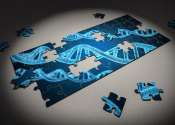Researchers discover a rare genetic form of dementia
A new, rare genetic form of dementia has been discovered by a team of Penn Medicine researchers. This discovery also sheds light on a new pathway that leads to protein build up in the brain—which causes this newly discovered ...
Oct 2, 2020
0
211









